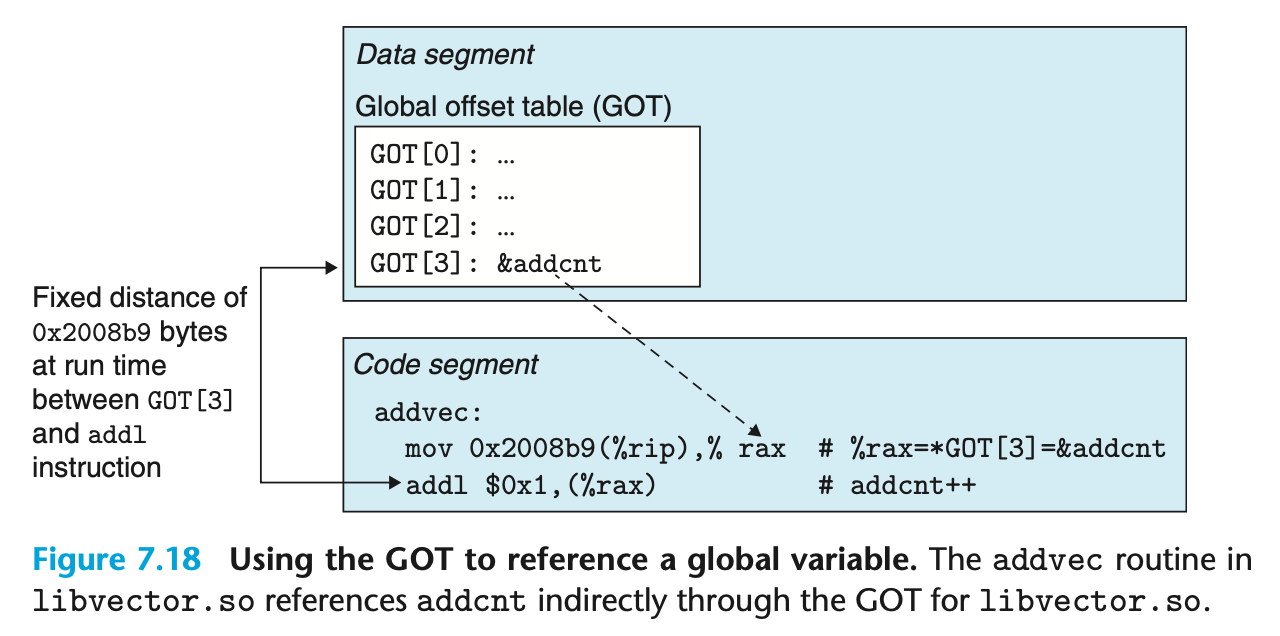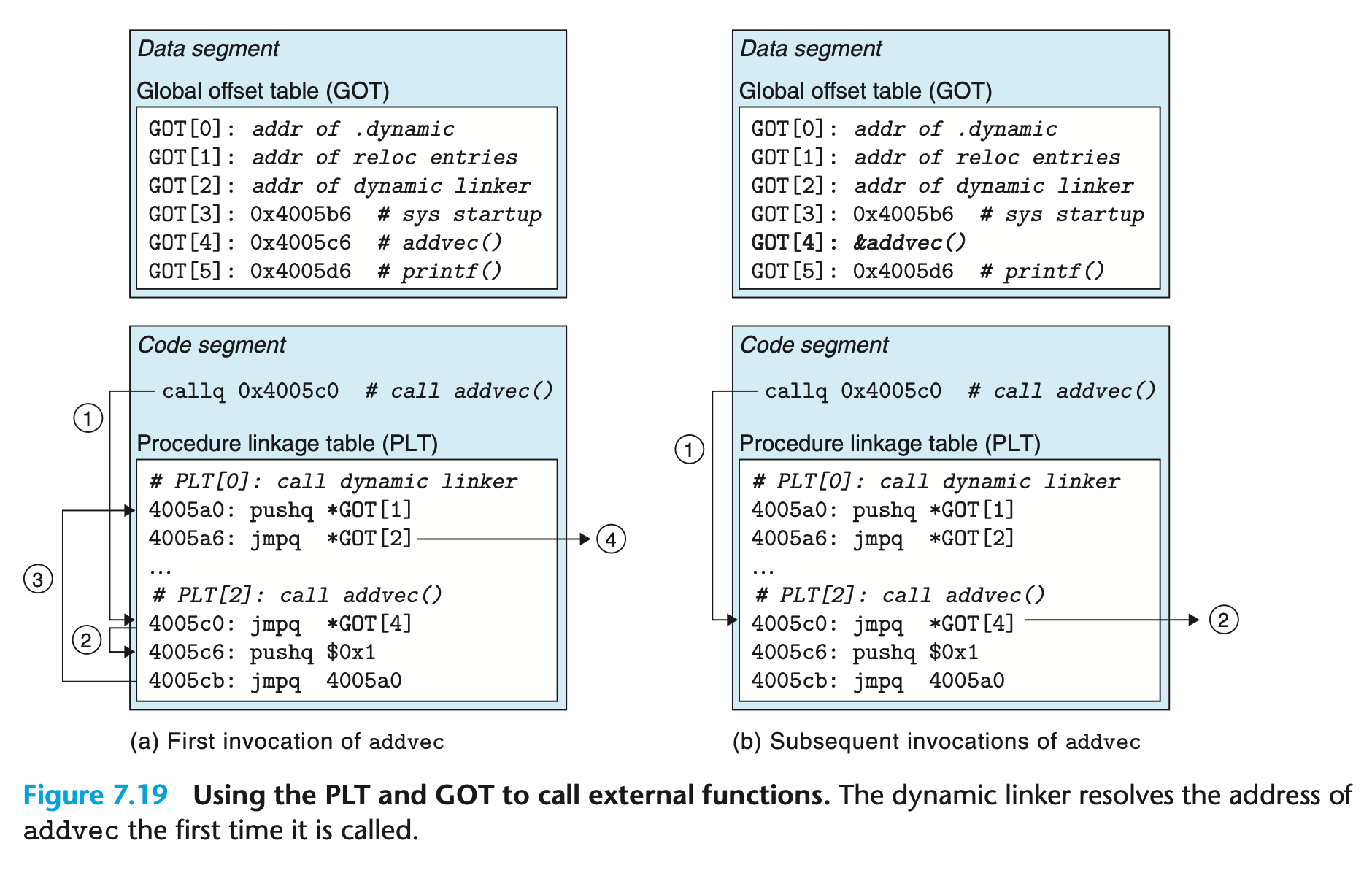COMS 4995 Advanced Systems Programming
Linking 2
Static library
- Related functions are grouped into separate object files, which in turn are
packaged into a single archive file that can be linked against. The linker will
pull in object files from the archive as needed.
ar rcs libvector.a addvec.o multvec.ogcc main.o libvector.a -o main
- Linker processes objects and archives from left to right on the command line. Place archives at the end of the command line.
Shared library
Motivation
- A single copy of code & data on disk
- A single shared mapping of
.textsection in memory
Building and running a shared library
main-dyn demo:
$ # Object files that will go into a shared library must be compiled with -fpic.
$ # gcc -shared builds a shared library.
$ make
gcc -Wall -fpic -c -o main.o main.c
gcc -Wall -fpic -c -o sum.o sum.c
gcc -shared -o libsum.so sum.o
gcc -o main-dyn main.o libsum.so
$ # Dynamic linker can't find our libsum shared library
$ ./main-dyn
./main-dyn: error while loading shared libraries: libsum.so: cannot open shared object file: No such file or directory
$ ldd main-dyn
linux-vdso.so.1 (0x00007ffc951cf000)
libsum.so => not found
libc.so.6 => /lib/x86_64-linux-gnu/libc.so.6 (0x00007f279d400000)
/lib64/ld-linux-x86-64.so.2 (0x00007f279d74f000)
$ # Shared library must either be registered on the system or in LD_LIBRARY_PATH
$ LD_LIBRARY_PATH=. ./main-dyn
sum=10
Loading & linking shared library using dlopen()
A shared library can be dynamically loaded and linked at runtime without
previously having linked to it. The main-dlopen program dynamically links
against libsum.so, finds the sum_array() function, and calls it.
main-dlopen demo:
$ # Note that we do not link against libsum.so
$ gcc -Wall main-dlopen.c
$ LD_LIBRARY_PATH=. ./a.out
sum=10
Library Interpositioning
We will use mymalloc.c, adapted from CSAPP Figure 7.22, to demonstrate a
powerful technique called “library interpositioning”. The dynamic linker in
Linux will load in shared objects specified in the LD_PRELOAD environment
variable before all others. This feature can be used to override functions in
other shared objects.
cal demo: Intercept malloc() and free() calls in the cal program:
$ gcc -fpic -shared -o mm.so mymalloc.c && LD_PRELOAD=./mm.so cal
malloc wrapper called
free wrapper called
malloc wrapper called
malloc wrapper called
...
free wrapper called
malloc wrapper called
malloc wrapper called
April 2024
Su Mo Tu We Th Fr Sa
1 2 3 4 5 6
7 8 9 10 11 12 13
14 15 16 17 18 19 20
21 22 23 24 25 26 27
28 29 30
free wrapper called
Position Independent Code (PIC)
Motivation
-
Recall symbol resolution & relocation: we calculated PC-relative addresses to symbols once they were resolved at link time.
-
But how do we do that for references to symbols defined in a shared library? Here are some issues:
- We don’t know where the symbols will be until the library is loaded, but
by that time, the text segment has already been
mmap()’d as read-only and we can’t apply the relocations. - By default, PC-relative addresses are encoded using 32 bits. This may not be enough to reach the memory location of the shared library in a 64-bit address space.
- Load-time relocation using 64-bit absolute addressing (
R_X86_64_64) is possible, but then the text segment needs to be writeable to apply relocations, and thus it cannot be shared among processes.
- We don’t know where the symbols will be until the library is loaded, but
by that time, the text segment has already been
Referencing global data from shared objects
Global offset table (GOT) adds one level of indirection for global data. CSAPP Figure 7.18 demonstrates how PIC uses the GOT to reference global data from shared objects.

Referencing functions from shared objects
Procedure linkage table (PLT) & GOT together add two levels of indirection for global functions defined in shared objects. This is illustrated in CSAPP Figure 7.19:

- Call PLT[i], which will then
jmp *GOT[j] - First time, GOT[j] is not filled:
- PLT[i] will fall through
- Calls dynamic linker with relocation entry for GOT[j], which is supposed to contain the function address.
- Dynamic linker locates the function
f, writesGOT[j] = &f, and thenjmp *GOT[j]
- The next call to PLT[i] will jump to the resolved function through GOT[j]
- Lazy binding: library functions not called by the process are left unresolved
PLT & GOT demo:
objdump -d main-dynmain()executescall 1070 <sum_array@plt>- PLT entry at
1070:bnd jmp *0x2f45(%rip) # 3fc0 <sum_array@Base>
readelf -a main-dyn:- Relocation entry in
.rela.pltfor GOT entry:Offset Info Type Sym. Value Sym. Name + Addend 000000003fc0 000300000007 R_X86_64_JUMP_SLO 0000000000000000 sum_array + 0
- Relocation entry in
readelf -x .got main-dyn- The hexdump shows the fallthrough address at
0x3fc0:0x1030Hex dump of section '.got': NOTE: This section has relocations against it, but these have NOT been applied to this dump. 0x00003fa8 a83d0000 00000000 00000000 00000000 .=.............. 0x00003fb8 00000000 00000000 30100000 00000000 ........0....... 0x00003fc8 40100000 00000000 50100000 00000000 @.......P....... 0x00003fd8 00000000 00000000 00000000 00000000 ................ 0x00003fe8 00000000 00000000 00000000 00000000 ................ 0x00003ff8 00000000 00000000 ........
- The hexdump shows the fallthrough address at
objdump -d main-dyn:- See fallthrough address in
.pltsection:0000000000001020 <.plt>: 1020: ff 35 8a 2f 00 00 push 0x2f8a(%rip) # 3fb0 <_GLOBAL_OFFSET_TABLE_+0x8> 1026: f2 ff 25 8b 2f 00 00 bnd jmp *0x2f8b(%rip) # 3fb8 <_GLOBAL_OFFSET_TABLE_+0x10> 102d: 0f 1f 00 nopl (%rax) 1030: f3 0f 1e fa endbr64 1034: 68 00 00 00 00 push $0x0 1039: f2 e9 e1 ff ff ff bnd jmp 1020 <_init+0x20> 103f: 90 nop
- See fallthrough address in
PIE vs Static/Dynamic linking
PIE and static/dynamic linkage are orthogonal concepts. Running file, ldd,
and objdump on the following four executables demonstrates this point:
main-dyn: pie & dynamically linked with libcmain-no-pie: no pie, but still dynamically linked with libcmain-static-pie: pie with statically linked libcmain-static: no pie & statically linked with libc
Last updated: 2024-04-09